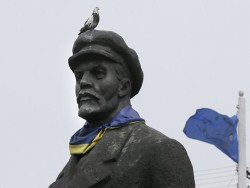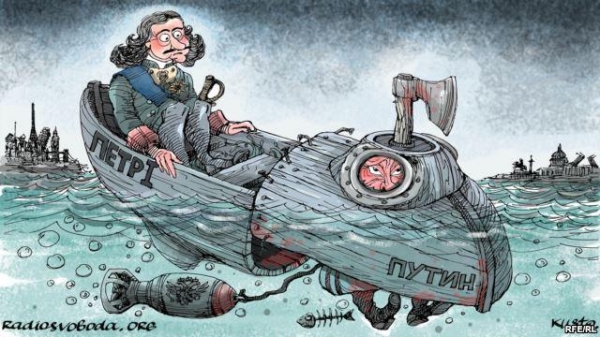
Concerned about the strengthening of Western influence in the former Soviet Union and the ousting of Pro-Russian elites as a result of popular uprisings at the beginning of 2000-ies, the Kremlin has established a number of proxy groups to support its foreign policy. This network Pro-Kremlin groups promoting the concept of so-called Russian peace — a flexible tool that allows you to justify the increased activity of Russia in the post-Soviet space and beyond. The Russian group have been particularly active in Georgia, Moldova and Ukraine, i.e. countries, declared their desire to move closer to the West.
Russia uses the language of “soft power” to mask attempts to “soft coercion” aimed at preserving superiority in the region. Russian pseudo-NGOs to undermine social cohesion in neighboring countries, through the consolidation of Pro-Russian forces and ethnic geopolitics, the denigration of national identity, and promoting anti-American, conservative-Orthodox and Eurasian values. They also try to impose alternative belief systems, in order to impede decisions, and to act as a destabilizing force, bringing militias and aggressive spreading propaganda.
The activities of these proxy groups combined with extensive administrative resources and security apparatus of the Russian state, as well as with the influence of the Russian Orthodox Church, Pro-Russian elites, mass culture and media can seriously harm the fragile mechanisms of the political transition and civil society in the region.
Inside the Kremlin system agents clearly distinguished three laps. The first consists of large state-Federal agencies, several large government-linked funds involved in issuing grants, and several private philanthropic organizations associated with Russian oligarchs. The second circle includes a small number of partners to ensure implementation of the decisions and their local satellites, which are financed from public funds through the presidential grants, or through large companies loyal to the Kremlin. The third circle consists of groups that share views of the Kremlin on the trajectory of the development of neighboring countries, but working outside the formal channels.
The first round
The main state news Agency, whose activities are aimed at Russian-speaking community worldwide, is the Federal Agency for Commonwealth of Independent States, compatriots living abroad and international humanitarian cooperation (Rossotrudnichestvo). It was founded in 2008 and currently is an umbrella organization for a network of compatriots, financing projects in the field of public diplomacy. This Agency manages a network consisting of 60 Russian centers of science and culture and 25 representative offices in Russian embassies, and in his system employs 600 people in different countries. In comparison, for example, with the British Council, which has offices in 100 countries around the world and which employs 8.7 thousand employees, this may seem a very limited presence, however, the centre plays an active role in Russian foreign policy, coordinating the activities of Pro-Russian players in the post-Soviet region and spreading the Kremlin’s belief system. Along with the new Concept of international development assistance, signed by President Vladimir Putin in 2014, the centre officially performs the flagship role in the development of the system of Russian “soft power”. All international financial assistance, for which he was responsible, the Ministry of Finance, now passes through the channels of this Agency. As a result, its budget in 2014 increased by 50% to 3 billion rubles (95,5 million dollars).
The Russian private sector also supports the promotion of the concept of the Russian world, investing in the promotion of conservative and Orthodox values in Russia and abroad. People known as “Orthodox oligarchs”, such as the founder of “Marshall capital Konstantin Malofeyev and the former head of Russian Railways Vladimir Yakunin, transferred for these purposes considerable funds through their private charitable foundations.
Owned by Malofeev, the Foundation of St. Basil the Great is one of the largest private foundations in Russia. In 2014, he spent more than 1.1 billion rubles ($17 million) for the implementation of various projects in Russia and abroad. In August 2014, Malofeev has launched its own TV channel “Tsargrad TV, a mixture of religious, ideological and nationalist rhetoric.
The second round
The second circle includes a small number of partners who execute the decisions and their branches in the region. It includes a variety of youth groups, analytical centers, smaller foundations, associations of compatriots, groups of Cossacks and war veterans.
One example can serve as schools of journalism in the Caucasus and in Central Asia that promote the Russian standards of journalism, and focus on the Russian line in covering the war in Ukraine. In the event involving journalists from RIA Novosti, “Russian reporter” and RT. For example, the program “New wave” — training for young people from Armenia, Azerbaijan, Georgia, Kazakhstan, Lithuania and Transnistria consisted of a lecture entitled “Censorship as a tool of media freedom”, as well as the professional advice of the Chairman of the Board of Directors “News”.
Third round
The circle of agents of the Kremlin was promoting the ultra-radical and neo-Imperial ideas and often organizes the region’s paramilitary youth camp.
The most prominent representative of the Eurasian ideology in modern Russia — is Alexander Dugin, who is no longer considered a marginal intellectual. Its objectives are to influence political circles and to form new generation. In 2003 he founded the International Eurasian movement, and in 2005, the Eurasian youth movement. The International Eurasian movement has members in twenty countries, as in the European Union and in the former Soviet republics. The website Dugin’s “Russian world of Eurasia” funded by presidential grants. Outside the post-Soviet space Dugin is trying to create a network of supporters of the Kremlin in Hungary, Greece, Italy, Poland, Romania, Serbia, France and Croatia.
Russia organized groups of ultra-nationalist and neo-imperialist intellectuals are complemented by paramilitary groups.
Network of associations of the Cossacks in Russia is estimated at approximately 740 thousand people, who are encouraged to collaborate with their partners in the former Soviet Union. Organization of the Cossacks has opened its branches in Belarus, Kazakhstan, Kyrgyzstan and Ukraine. They organize paramilitary youth camps in Armenia, Belarus, Kyrgyzstan, Moldova and Ukraine. For example, in 2013 the summer camp “Sich Taurida” in Crimea were trained 170 young people from Ukraine, Russia and Transnistria, where they were taught shooting, martial arts, and basic survival skills.
Is it really working?
Russian proxy organizations exert considerable influence, especially where there are large Russian-speaking media. They create an atmosphere of uncertainty, where they are portrayed as “genuine civil society”, they are fixed as part of the public space and promote a destructive belief system. Their signals resonate with those who are nostalgic for the Soviet Union. Russia still possesses “soft-power” that can benefit from the remnants of Pro-Soviet sentiment that audience. Radical nationalist movements and the younger generation they offer the concept of lifting the head of Russia and new poles of Eurasian civilization, challenging the United States.
A more destructive feature of Russian agents manifested in their attempts to prepare the ground for separatism and mobilize citizens around the Pro-Russian ideas. Moreover, the Russian proxy groups play an important role in the initiation of negative attitudes towards the ruling elites in the former Soviet Union to thwart reform and to block the movement toward integration with the West.
What the West?
To combat the potential threat from the Russian government-funded proxy groups, it is important to understand their essence. Local media needs to understand that representatives and commentators associated with such groups, not always can be considered “independent experts”. To check for Russian state-controlled media operating overseas, for compliance of their activities with the rules established in their host countries, and if necessary to impose penalties for violations of these rules. Observer organizations have to fight the misinformation and to create a professional and reputable sources of information focused on Russian-speaking audience. The activities of proxy groups should be under the scrutiny of local authorities, and groups that undermine the sovereignty of the state in whose territory they are located, or threatening its territorial integrity, must be covered.
Western Pro-democracy organizations need to focus on the deeper involvement of citizens in their programs and to establish contacts with representatives of local non-traditional civil society, such as different cultural groups, religious charities, associations of parents. A strong independent civil society organizations needs to establish what part of society are the objects of Russian propaganda and its agents, to make efforts for more effective networking and to create a neutral, depositsonline public space for the expression of diverse views and build consensus. Such steps are critical to building social cohesion, building trust and finding a common language with which we can carry out reforms and to make society more democratic. No time to waste, and for the West not to treat the developing democracies and open space for civil society as something that is already completely formed.








